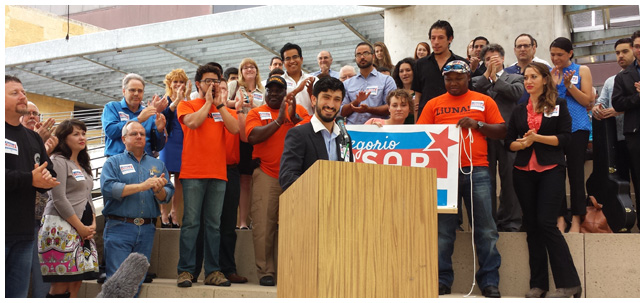 Texas’s capital city is economically booming in a way that’s almost unlike any other city in America, largely because of the region's technology industries. Now, it is time for Austin to take the next step to ensure that the high-wage, high-tech economy also supports the creation of quality blue-collar jobs for working families.
Texas’s capital city is economically booming in a way that’s almost unlike any other city in America, largely because of the region's technology industries. Now, it is time for Austin to take the next step to ensure that the high-wage, high-tech economy also supports the creation of quality blue-collar jobs for working families.
That’s the argument laid out by Gregorio Casar, one of the “junkyard dogs” at the Workers Defense Project and now a candidate for Austin City Council. He’s running for office at a chaotic time for Austin municipal elections now that the city has – as others have – moved to single-member districts that will allow each neighborhood to choose who represents them rather than having only at-large council members. As many as six other candidates may be in the race with Casar before the vote this fall.
“Traditionally, the construction industry has created the blue-collar jobs that serve as a pathway to the middle class. However, because government and industry haven't worked together to make sure our common-sense employment laws are followed, construction jobs are becoming dead-end, dangerous jobs no one wants,” Casar said. “I'm not talking about piling on burdensome regulations. We need to enforce the common-sense rules that we've already got, like paying workers by the hour, paying overtime, and providing basic training.”
As Casar sees the situation, the city council in Austin could take swift and relatively simple steps to make sure responsible construction businesses can keep doing what they do best: build the monuments of the city while creating good jobs.
The three steps Casar wants to happen first are:
- The city of Austin should be a model for setting sensible standards and enforcing them on all city-owned projects. Austin's Public Works Department is currently entrusted with $400 million worth of projects, including the $120 million Central Library. In addition, Austin Energy, the city's publicly owned utility, budgeted $220 million in capital improvement projects last year. The C3 standards should be minimum standards for these taxpayer-funded projects, and enforcement could pay for itself if the city collects meaningful fines from bad actors.
- The city of Austin supports a wide variety of public-private partnerships with major developers every year. Austin should support positive developments that will improve the city, but should also ensure that those projects receiving community assistance support blue-collar workers and the responsible construction contractors that train workers, pay by the hour, and create a pathway to the middle class.
- Austin Energy should vigorously grow its green-jobs program, creating hundreds more jobs retro-fitting old residences, installing solar panels, and upgrading city buildings. Other cities have shown that taxpayers quickly saw the returns on energy conservation once those cities were able to buy less power during peak summer afternoons. Once again, these green-jobs can be family-supporting if the city sets high employment standards in contract documents, and enforces those standards.
“All of our taxpayers will benefit from a strong construction industry,” Casar said. “A vibrant industry that takes care of its workers will enhance our tax revenues, create stronger neighborhoods, reduce the strain on the families of our school children, lessen the burden on emergency rooms, and ensure more people have the chance to take part in Austin's promise.”
The C3 standards Casar referenced are the principles we’ve told you about time and again under the Construction Career Collaborative.
Earlier this year, the chairman of the Texas House Business and Industry Committee said that in addition to finding ways to punish companies that cheat, lawmakers should also look for ways to reward companies that are leading the way when it comes to ethical practices. Tax credits for those firms that participate in C3 might be one option, Representative René Oliveira, said during a hearing on worker misclassification and workers’ comp.
It is highly encouraging to see leaders at the city level as well as in the Texas Legislature take note of what ethical companies are trying to accomplish with the program.



Add new comment